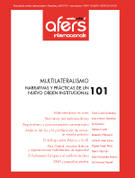Introducción: el multilateralismo en crisis
Palabras clave:
multilateralismo, sistema internacional, sociedad internacional, teorías, institucionalismoResumen
Revista CIDOB d’Afers Internacionals, nº 101
Cuatrimestral (abril 2013)
ISSN:1133-6595 | E-ISSN:2013-035X
El multilateralismo no es un sistema estático de normas y organizaciones, creadas de una vez y para siempre, ni siquiera un sistema que permanezca inmutable en lo esencial. El multilateralismo ha sufrido y sufre transformaciones muy notables. No se trata, sin embargo, de transformaciones que puedan entenderse como un flujo continuo de cambios. Pueden identificarse distintas fases o tipos ideales en la evolución del sistema multilateral. Y puede argumentarse también que el paso de una a otra está relacionado con cambios en algunas variables clave del orden mundial, en el sentido que Robert W. Cox da al término. Así, este artículo sugiere, de manera abiertamente tentativa, una historia del multilateralismo (y sus diferentes tipos) que lo concibe como expresión institucional de (ciertos tipos) de la sociedad internacional.
Citas
Barbé, Esther. «Multilateralismo: adaptación a un mundo con potencias emergentes». Revista Española de Derecho Internacional, LXII, 2 (2010), p. 21-50.
– «Institutiones, normas y conflictos: los años devorados por las langostas». Ponencia en las Jornadas de la Asociación Española de Profesores de Derecho Internacional y Relaciones Internacionales, 20-22 de octubre de 2011, Córdoba.
Barnett, Michael y Duvall, Raymond. «Power in international politics». International Organization, n.º 59 (2005), p. 39-75.
Breslin, Shaun. «China’s emerging global role: Dissatisfied responsible great power». Politics, vol. 30, n.º s1 (2010), p. 52-62.
Burley, Anne Marie. «Regulating the world: Multilateralism, international law, and the projection of the New Deal regulatory state», en: Ruggie, John Gerard (ed.). Multilateralism matters. The theory and praxis of an institutional form. Nueva York: Columbia University Press, 1993, p. 125-156.
Buzan, Barry y Waever, Ole. Regions and powers: the structure of international security. Cambridge: Cambridge University Press, 2003.
Caporaso, James. «International Relations Theory and Multilateralism: The Search for Foundations», en: Ruggie, J.G. (ed.). Multilateralism Matters. The Theory and Praxis of an Institutional Form. Nueva York: Columbia University Press, 1993, p. 51-90.
Cooper, Robert. The postmodern state and the world order. Londres: Demos, The Foreign Policy Centre (original 1996), 2000.
Cox, Robert W. «Social forces, states, and world orders: beyond international relations theory (1981)», en: Cox, Robert W. y Sinclair, Timothy J. (eds.). Approaches to World Order. Cambridge: Cambridge University Press, 1996 [1981], p. 85-123.
– «Gramsci, hegemony, and international relations: an essay in method (1983)», en: Cox, Robert W. y Sinclair, Timothy J. (eds.). Approaches to World Order. Cambridge: Cambridge University Press, 1996 [1983], p. 124-143.
Drori, Gili. S. y Krücken, Georg. «World Society: A Theory and a Research Program in Context», en: Krücken, G. y Drori, G.S. (eds.). World Society. The Writings of John W. Meyer. Oxford: Oxford University Press, 2009, p. 3-35.
Friedman, Wolfgang. The Changing Structure of International Law. Londres: Stevens & Sons, 1964.
Gowan, Richard y Brantner, Franziska. Is the EU a global force for human rights? An audit of European power at the UN. European Council on Foreign Relations, 2008.
Grevi, Giovanni. «The Interpolar World. A New Scenario». Occasional Paper, n.º 79 (2009). European Union Institute for Security Studies.
Haas, Peter M. «UN Conferences and Constructivist Governance of the Environment», Global Governance, n.º 8 (2002), p. 73-91.
Hamilton, Rebecca, J. «Responsability to Protect: From Document to Doctrine – But What of Implementation». Harvard Law School Human Rights Journal, n.º 19 (2006), p. 289-297.
Huntington, Samuel P. «The Lonely Superpower». Foreign Affairs, vol. 78, n.º 2 (1999), p. 35-49.
Hurrell, Andrew. «Hegemony, liberalism and global order: what space for wouldbe great powers?». International Affairs, vol. 82, n.º 1 (2006), p. 1-19.
Ikenberry, John G. «Institutions, Strategic Restraing, and the Persistence of American Postwar Order». International Security, vol. 23, n.º 3 (1998/1999), p. 43-78.
Kegley, C. Jr. «The Neoidealist Moment in International Studies? Realist Myths and the New International Studies». International Studies Quarterly, vol. 37, n.º 2 (1993), p. 131-146.
Kratochwil, Friedrich. «Norms versus numbers: Multilateralism and the rationalist and reflexivist approaches to institutions –a unilateral plea for communicative rationality»”, en: Ruggie, John Gerard (ed.). Multilateralism matters. The theory and praxis of an institutional form. Nueva York: Columbia University Press, 1993, p. 443-474.
Krauthammer, Charles. «The Unipolar Moment». Foreign Affairs, vol. 70, n.º 1 (1990/1991), p. 23-33.
Kaldor, Mary. New and Old Wars. Organized Violence in a Global Era. Stanford, 1999.
Martin, Lisa L. «The rational state choice of multilateralism», en: Ruggie, John Gerard (ed.). Multilateralism matters. The theory and praxis of an institutional form. Nueva York: Columbia University Press, 1993, p. 91-121.
Meyer, John W. «Globalization: Sources and effects on national states and societies» en: Krücken, G. y Drori, G.S. (eds.). World Society: The Writings of John W. Meyer. Oxford: Oxford University Press, 2009.
Newman, Edward. A Crisis in Global Institutions? Multilateralism and International Security. Londres: Routledge, 2007.
Paris, Roland. «Human security: paradigm shift or hot air?». International Security, vol. 26, n.º 2 (2001), p. 87-102.
Rüland, Jürgen. «The rise of “dimininished multilateralism”: East Asian and European forum shopping in global governance». Asia Europe Journal, n.º 9 (2012), p. 255-270.
Ruggie, John Gerard. «Multilateralism: the anatomy of an institution», en: Ruggie, John Gerard (ed.). Multilateralism matters. The theory and praxis of an institutional form. Nueva York: Columbia University Press, 1993, p. 3-47.
Sinclair, Timothy J. «Beyond international relations theory: Robert W. Cox and approaches to world order», en: Cox, Robert W. y Sinclair, Timothy J. (eds.). Approaches to World Order. Cambridge: Cambridge University Press, 1996, p. 3-18.
Slaughter, Anne-Marie. A New World Order. Princeton: Princeton University Press, 2004.
Weiss, Thomas G. «The Sunset of Humanitarian Intervention? The Responsibility to Protect in a Unipolar Era». Security Dialogue, vol. 35, n.º 2 (2004), p. 135-153.
Zürn, Michael y Stephen, Matthew. «The view of old and new powers on legitimacy of international institutions». Politics, vol. 30, n.º s1 (2010), p. 91-101.













